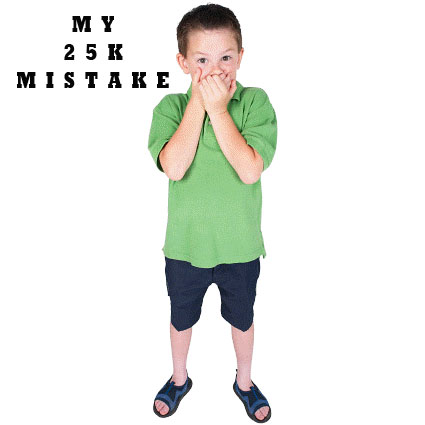- You are here:
- Home »
- Blog »
- Real Estate Business »
- My $25,000 Dollar Mistake
My $25,000 Dollar Mistake

Unfortunately, when you make a mistake in real estate, the stakes are usually much higher than in many other businesses. Sometimes you need to re-evaluate your filtering strategy or your legal documents to ward off costly blunders, while other times you need to look at your referral network or advertising strategy. We invest time in doing our due diligence on those people we work with, but sometimes the unforeseeable happens and you need to roll with the punches.
We have created joint ventures with people on many different real estate projects over the past decade, raising upward of seven figures from our partners, who received an amazing return on their investment. The following example is the only joint venture that met an unfortunate and untimely end.
We have also partnered with people who don’t have money for the down payment but would like to qualify for the mortgage. By partnering with us, they are still able to gain an equity share of the project.
In this particular situation, we formed a joint venture agreement around the purchase of a property in Durham. This property was a typical buy, fix, refinance, and hold property. (If you are interested in learning more about this strategy, the book “The Ultimate Wealth Strategy” is focused on the topic). In this joint venture, it was my name that appeared on the mortgage and title, and not the joint venture partner’s.
We typically do our best to purchase a house with equity in it. In this case, we used cash to buy a house that needed about $25,000 in renovations, and then we refinanced it for the full market value. This particular house ended up having $50,000 in equity in it after all our costs, within a a year of owning it. A good purchase with great renovations and solid rent.
Our intention was to hold the property for 5 to 10 years or more. Sadly, our joint venture partner had other ideas. If it hadn’t been my name on the title and on the mortgage, it could have forced the sale of the property or required me to find financing that would have been more expensive. Fortunately, I was able to have my lawyer draw up legal documents to dissolve the joint venture agreement.
Well, instead of following through with the 5- to 10-year plan, this gentlemen wanted to take the money and run. Our current joint venture agreement gave us a few options — sell the property, agree on a buyout price for the joint venture partner, or sell the partner’s share to another investor.
We opted to buy out the partner, as the two other options really didn’t make sense to us at the time.
I learned that aligning our vision with our partners’ is something that we will need to focus on in the future, including improving our joint agreements to help accentuate our shared goals.
On the brighter side of things, we like to view this experience as part of a positive learning curve, especially when working with partners. The property has great long-term potential and cash flows quite well, at a little over $400 a month, with a 5-year variable rate mortgage.
After the renovation costs, we were planning on investing $3,000 in the property. We ended up putting $25,000 more into the property for the buyout. So in total, we put in about $28,000 into the project, have about $52,000 in equity in the property, and own 100% percent of the property.
Considering this is close to 100% ROI in less than a year — and we don’t have to share the profits anymore — I’m going to take it as a win!
About the Author Quentin DSouza
Quentin D’Souza is the Chief Education Officer of the Durham Real Estate Investor Club. Author of The Action Taker's Real Estate Investing Planner, The Property Management Toolbox: A How-To Guide for Ontario Real Estate Investors and Landlords, The Filling Vacancies Toolbox: A Step-By-Step Guide for Ontario Real Estate Investors and Landlords for Renting Out Residential Real Estate, and The Ultimate Wealth Strategy: Your Complete Guide to Buying, Fixing, Refinancing, and Renting Real Estate.

